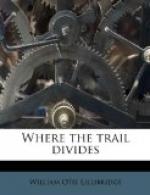“McPherson,” he said, “this morning I called you coward. That you are not such you have proven, you are proving now. For this reason I ask your pardon. For this reason as well, I give you warning. What we will find—where we are going, I do not doubt, now. I do not believe you doubt. For it I hold you responsible. You had best turn back before belief becomes certainty.” Unnaturally precise, cold as November raindrops came the words, the sentences. Deadly in meaning was the pause that followed. “I repeat, you had best turn back.”
For a long half minute, face to face there in the moonlight, Landor waited; but no answer came. Just perceptibly he shifted in his place.
“I may forget, give my promise of the morning the lie. Do you understand?”
“Yes, I understand.”
Another half minute, ghastly in its significance, passed; then without a word Landor turned. “You have heard, men,” he said, “and may God be my judge.”
The full moon was well in the sky, showing clear every detail in that scene of desolation, when they arrived. Patter, patter, patter sounded their hoof-beats in the distance. More and more loud they grew, muffled yet penetrating in the silence of night, always augmenting in volume. Out of the shadows figures came dimly into view, taking form against the background of constellations. The straining of leather, the music of steel in bit and buckle, the soft swish of the sun-dried grass proclaimed them very near; then across the trampled corn patch, into the open where had stood the shanty, where now was a thin grey layer of ashes, came the riders, and drew rein; their weary mounts crowding each other in fear at something they saw. Like a storm cloud they came; like the roll of thunder following was the oath which sprang to the lips of every rider save one. Good men they were, God-fearing men; yet they swore like pirates, like humans when ordinary speech is not adequate. In the pause but one man acted, and none intervened to prevent what he did. Out into the open, away from the others, rode Scotchman McPherson; halted, his hand on the holster at his hip. For a second, and a second only, he sat so, the white moonlight drawing clear every line of his grizzled face, his stocky figure. Then deliberately his hand lifted, before him there appeared a sudden blaze of fire, upon the silence there broke a single revolver report, from beneath his lifeless bulk the horse he rode broke free, gave one bound, by instinct halted, trembling in every muscle; then over all, the quick and the dead, returned silence: silence absolute as that of the grave.
How long those twenty men sat there, gazing at that mute, motionless figure on the ground not one could have told. Death was no stranger to them. For years it had lurked behind every chance shrub they passed, in the depths of every ravine, in the darkness of night, from every tangle of rank prairie grass in broad daylight. To it from long familiarity they had become callous; but death such as this, deliberate, cold-blooded, self-inflicted—it awed them while it fascinated, held them silent, passive.




